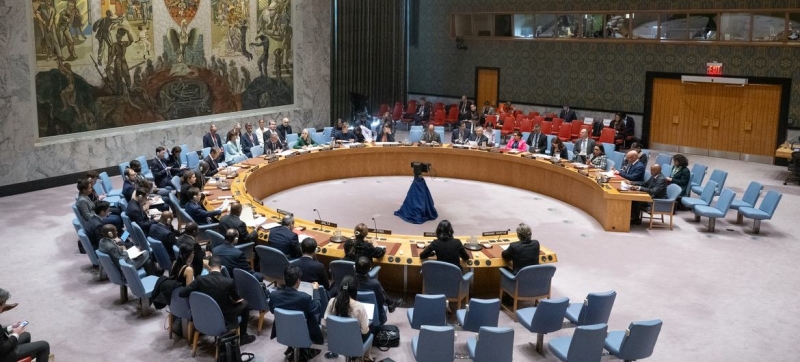
Security Council meeting. UN representative announces latest figures on casualties in war against Ukraine Peace and Security
Russia’s ongoing, systematic attacks continue to inflict enormous suffering on the people of Ukraine. Civilian casualties and significant damage to critical civilian infrastructure are reported daily, with the Donetsk, Kharkiv, Kherson, Mykolaiv and Sumy regions of Ukraine bearing the brunt.
Assistant Secretary-General for Europe, Central Asia and the Americas Miroslav Jenča made this statement at a briefing in the UN Security Council. In particular, he recalled the shelling – today and last weekend – in Zaporizhia and Kryvyi Rih, which killed several people, as well as the strikes in Donetsk, Kharkiv, Mykolaiv and Kherson skaias several days earlier.
Death and destruction far from areas of active hostilities
While the effects of the war continue to be felt most in frontline communities in eastern and southern Ukraine, death and destruction are also a daily reality far from areas of active hostilities, Jenča emphasized.
“This includes residential areas of the capital Kyiv, which were again hit by drone attacks this morning and over the weekend. On 16 October, Kyiv was reportedly hit by more than 130 drones. Lviv in western Ukraine and Odessa in the south have also been hit repeatedly,” the Assistant Secretary-General said.
He noted that the UN is also concerned about the consequences of the continuation of hostilities on the Russian-Ukrainian border, particularly in the Kursk region of the Russian Federation, following Ukraine’s invasion in August.
“At least 208 Ukrainian civilians were killed and 1,220 injured in September, making it the month with the highest number of civilian casualties in Ukraine this year,” Jenca said.
According to the Office of the High Commissioner for Human Rights (OHCHR), 11,973 Ukrainian civilians have been killed, including 622 children, since Russia’s full-scale invasion began in February 2022. 25,943 people have been injured, including 1,686 children.
We reiterate that any attacks on civilians and civilian infrastructure are prohibited under international law, wherever they occur. They are unacceptable and must stop immediately.
Attacks on Ukrainian Black Sea ports
Civilian vessels and port infrastructure are also protected by international humanitarian law, Jenca recalled.
“Unfortunately, in recent weeks we have witnessed a resumption of Russian attacks on Ukrainian Black Sea ports. According to local authorities, since September 1, six civilian vessels have been damaged as a result of these attacks, as well as grain infrastructure in the ports,” the Assistant Secretary-General said.
“As a result, between September 1 and October 14, wheat prices increased by more than 6 percent. Risk insurance prices for Ukrainian exporters have increased sharply, which has affected the Ukrainian agricultural sector,” he added.
Jencha stressed that the stability of agricultural exports through the Black Sea remains critical to global food security. He noted that the UN continues to engage with Ukraine, Russia and Turkey, as well as other stakeholders, to maintain freedom and safety of navigation in the Black Sea.
Attacks on Ukraine’s energy infrastructure
Systematic Russian attacks on Ukraine’s energy infrastructure have become a feature of the war, the UN assistant chief said. He warned that the population is likely to face power and water shortages across the country for a third winter in a row.
“Vulnerable groups, including older people, people with disabilities and internally displaced persons, are likely to be disproportionately affected. Many may soon find themselves “trapped” in their homes, without heating or other essential services,” Jenca said.
Torture of Ukrainian prisoners of war
Massive and systematic reports of torture of Ukrainian prisoners of war remain a serious concern, the Assistant Secretary-General said. Ninety-seven per cent of Ukrainian prisoners interviewed by OHCHR since March 2023 said they had been tortured or ill-treated while in captivity. Sixty-eight per cent reported sexual violence.
Half of the Russian prisoners of war interviewed by OHCHR reported torture or ill-treatment, mostly during the initial stage of internment, Jenča added.
“We call on the authorities of the Russian Federation, as well as Ukraine, to put an end to this practice and bring those responsible to justice,” he said.
“We welcome the exchange of 95 prisoners of war from each side last Friday and call for further exchanges,” the Assistant UN chief added.
The security of Ukraine’s nuclear facilities is at risk
As long as the war continues, the security of Ukraine’s nuclear facilities remains at risk, the UN Assistant Secretary-General stressed. Jenca. The situation at the Zaporizhia Nuclear Power Plant in Ukraine is particularly volatile.
“Regular explosions, drone attacks, gunfire and repeated outages in external power supply have been reported, increasing the risk of a nuclear accident. The International Atomic Energy Agency is also monitoring the consequences of military actions in the area of Russia’s Kursk Nuclear Power Plant,” the Assistant Secretary-General said.
“We continue to call on all parties concerned to exercise maximum restraint,” he added.
The UN stands ready to support all efforts aimed at achieving a just, comprehensive and lasting peace in Ukraine in accordance with the UN Charter, international law and General Assembly resolutions, Jenca concluded.
